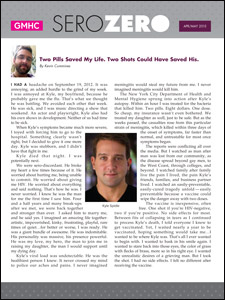 I grew up in a small town where my father would fill every prescription at our local pharmacy. Our pharmacist, Dr. Kahn, was like a member of our family. He provided critical guidance on potential drug interactions, and he would even consult with my doctor about any new prescriptions before filling them just to make sure everyone was clear about my treatment. As a kid, I was more focused on the candy Dr. Kahn gave me every time my father brought me to the pharmacy. But looking back, I’m thankful that he gave so much to ensure my care was safe and effective, simply by doing the job he was trained to do.
I grew up in a small town where my father would fill every prescription at our local pharmacy. Our pharmacist, Dr. Kahn, was like a member of our family. He provided critical guidance on potential drug interactions, and he would even consult with my doctor about any new prescriptions before filling them just to make sure everyone was clear about my treatment. As a kid, I was more focused on the candy Dr. Kahn gave me every time my father brought me to the pharmacy. But looking back, I’m thankful that he gave so much to ensure my care was safe and effective, simply by doing the job he was trained to do.
When I moved to New York City as an adult, I didn’t hesitate to go to a small, local pharmacy that my friends raved about. I loved my experience there. Just like Dr. Kahn, my new pharmacist would ask me about the medications I was taking, fill my prescriptions on time, and even deal with the convoluted health insurance bureaucracy on my behalf. The safety and peace of mind provided by my relationship with my pharmacist made living with a long-term, chronic illness so much easier.
That all ended in January 2013 when my pharmacist told me that I needed to contact my insurance provider because it would no longer authorize him to refill my prescriptions. My insurer told me that I would either need to enroll in its mail order pharmacy, or pay the full cost for each prescription I filled at my local pharmacy. Given the cost of my medications, I had no choice. I consider myself “lucky” for even being warned about this change in advance. Many HIV-positive clients I work with at Gay Men’s Health Crisis (GMHC) have been blindsided and switched to mail order without any notice at all, causing them to go days or even weeks without their anti-retroviral medications.
My right to privacy, especially about my health and medications, is paramount. When the mail order pharmacy representative I spoke to over the phone explained that I would have to use either UPS or FedEX to receive my medications, I was immensely concerned. When I explained that I lived in an apartment without a doorman who can receive the package, the representative coldly suggested that I either take the delivery day off from work, have the medications delivered at work, or have them delivered to my doctor’s office.
None of those options were acceptable. It was not possible for me to take a day off from work every month just to receive my medications, and I should not have to choose between protecting my privacy and allowing someone in the mail room at my workplace to receive my personal packages, even if that was an option. Additionally, my doctor’s office would not accept deliveries on my behalf. Fortunately, after speaking to a mail order pharmacy supervisor I was given permission for my medications to be delivered to my mailbox by the U.S. Postal Service without requiring a signature. I breathed a sigh of relief.
 |
| Lyndel Urbano, Manager of Government Affairs |
For the next two months, I called the mail order pharmacy to fill my prescriptions and they arrived on time. But whenever I asked about drug interactions, I was read scripted and incomplete responses over the phone by “specialists” who were unable to pronounce the names of my medications. On the third month, I received an orange slip in my mailbox asking for a signature for the delivery. As a result, I had to take time off from work to wait in line at the post office.
The following month, I arrived home to my neighbor shaking a bag of medication in front of me and saying, “This arrived for you. The post office put it in my mailbox.” I was gripped with anxiety. Did she look in the bag? Is she going to tell anyone else about my illness? In response, I immediately requested an exemption from having to use the mail order pharmacy, but my request was rejected. I appealed. It was rejected. I appealed again and again for a total of three months, to no avail.
From then on, every time I re-ordered my medications I constantly worried about protecting my privacy and needing to unnecessarily take more time off work. Recently, a GMHC client who is also being forced to use a mail order pharmacy mirrored my personal experience:
All I ask is for some control over my own privacy, and who knows about my illness, and what medications I am taking. I would rather pick up the medications at a pharmacy. That way, I would have control over who sees my medications. On several occasions I have not received my medications on time, and twice, including this month, my medications were left in my neighbor’s mailbox.
These experiences prompted me to contact the New York State Attorney General’s (AG) Health Care Bureau to request assistance for myself and the dozens of GMHC clients being affected by mandatory mail order. After I provided documentation of my appeals and rejections, the AG’s office successfully negotiated a one-year exception that allowed me to fill my prescriptions at my local pharmacy. Over the past few years, some GMHC clients have also had to take that extraordinary step to get short-term exceptions. Many others have not been so lucky.
In September 2013, I read an article in POZ magazine that updated a story written by Larry Kramer about his mandatory mail order experience. It mentioned class action lawsuits filed by the patient advocacy group Consumer Watchdog in federal court in California against two insurers, United Health Care and Anthem. The lawsuit alleged that obligating people living with HIV or AIDS (PLWHA) to use mail order pharmacies was discriminatory. Eventually, Anthem and United agreed to a settlement that forced them to allow PLWHA to opt out of mandatory mail order, without acknowledging fault.
United now allows PLWHA to opt-out by submitting requests in the mail, over the phone, or online. Anthem, however, does not have a formal process and patients must call customer assistance to opt out. Despite some success with United and Anthem, many PLWHA who use other insurance providers are still being forced to use mail order pharmacies. Recently, a third insurer, Aetna, was also sued in federal court by Consumer Watchdog. The lawsuit alleges that Aetna’s Qualified Health Plans offered on California’s health exchange are discriminating against PLWHA.
In response to the Anthem settlement, the New York State AG sent a letter to 15 major insurers asking them to also allow PLWHA to opt out of mandatory mail order. The U.S. Department of Health and Human Services (HHS) has also issued a final regulation that requires insurers, beginning in 2017, to offer alternatives to mail order pharmacies. However, that regulation allows the insurer to charge an extra fee to those who opt out.
My one-year exemption from mandatory mail order will end soon, long before the new HHS regulation takes effect. Locally, I am helping to lead a broad coalition of patient interest groups in New York State fighting to pass a bipartisan bill that finally prohibits insurers from forcing patients to only use mail order pharmacies.
Patients should have a choice. For some, mail order may be their best option, but that has not been my experience. I value having the choice and peace of mind that comes from working with my trusted, state-licensed, local pharmacist. I should not be forced to do anything that jeopardizes my privacy or health, and neither should anyone else.
From the April/May issue of SeroZero by GMHC. To read the issue as a PDF, click here.







1 Comment
1 Comment